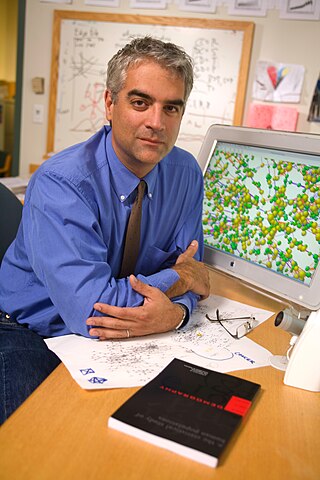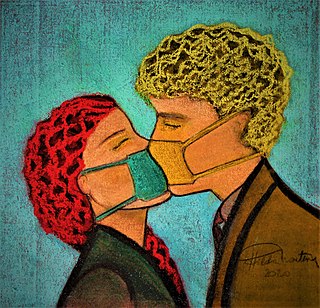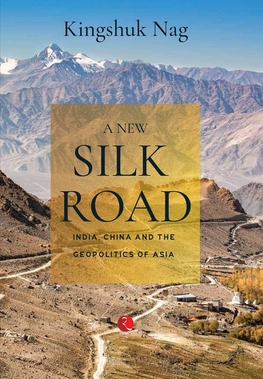Related Research Articles

Rajeev "Raj" Patel is a British academic, journalist, activist and writer who has lived and worked in Zimbabwe, South Africa, and the United States for extended periods. He has been referred to as "the rock star of social justice writing."

Nicholas A. Christakis is a Greek-American sociologist and physician known for his research on social networks and on the socioeconomic, biosocial, and evolutionary determinants of human welfare. He is the Sterling Professor of Social and Natural Science at Yale University, where he directs the Human Nature Lab. He is also the co-director of the Yale Institute for Network Science.

Rupa Marya is a doctor, activist, musician and writer based on San Francisco. She is a Professor of Medicine at the UCSF School of Medicine and co-author of the book Inflamed: Deep Medicine and the Anatomy of Injustice.

Bret Samuel Weinstein is an American podcaster, author, and former professor of evolutionary biology. He served on the faculty of Evergreen State College from 2002 until 2017, when he resigned in the aftermath of a series of campus protests about racial equity at Evergreen, which brought Weinstein to national attention. Like his brother Eric Weinstein, he is considered part of the intellectual dark web. Weinstein has been criticized for making false statements about COVID-19 treatments and vaccines, and for spreading misinformation about HIV/AIDS.

The COVID-19 pandemic, caused by severe acute respiratory syndrome coronavirus 2 (SARS-CoV-2), began with an outbreak of COVID-19 in Wuhan, China, in December 2019. It spread to other areas of Asia, and then worldwide in early 2020. The World Health Organization (WHO) declared the outbreak a public health emergency of international concern (PHEIC) on 30 January 2020, and assessed the outbreak had become a pandemic on 11 March.

The COVID-19 pandemic has had far-reaching consequences beyond the spread of the disease itself and efforts to quarantine it, including political, cultural, and social implications.

False information, including intentional disinformation and conspiracy theories, about the scale of the COVID-19 pandemic and the origin, prevention, diagnosis, and treatment of the disease has been spread through social media, text messaging, and mass media. False information has been propagated by celebrities, politicians, and other prominent public figures. Many countries have passed laws against "fake news", and thousands of people have been arrested for spreading COVID-19 misinformation. The spread of COVID-19 misinformation by governments has also been significant.

Racial capitalism is a concept reframing the history of capitalism as grounded in the extraction of social and economic value from people of marginalized racial identities, typically from Black people. It was described by Cedric J. Robinson in his book Black Marxism: The Making of the Black Radical Tradition, published in 1983, which, in contrast to both his predecessors and successors, theorized that all capitalism is inherently racial capitalism, and racialism is present in all layers of capitalism's socioeconomic stratification. Jodi Melamed has summarized the concept, explaining that capitalism "can only accumulate by producing and moving through relations of severe inequality among human groups", and therefore, for capitalism to survive, it must exploit and prey upon the "unequal differentiation of human value."
Chandra L. Ford is an American public health academic who is Professor of Community Health Sciences at the University of California, Los Angeles. She serves as Founding Director at the Center for the Study of Racism, Social Justice & Health. Her research considers relationships between racism and health outcomes.

Rachel Renee Hardeman is an American public health academic who is associate professor of Division of Health Policy and Management at the University of Minnesota School of Public Health. She holds the inaugural Blue Cross Endowed Professorship in Health and Racial Equity. Her research considers how racism impacts health outcomes, particularly for the maternal health of African-Americans.

Caste: The Origins of Our Discontents is a nonfiction book by the American journalist Isabel Wilkerson, published in August 2020 by Random House. The book describes racism in the United States as an aspect of a caste system—a society-wide system of social stratification characterized by notions such as hierarchy, inclusion and exclusion, and purity. Wilkerson does so by comparing aspects of the experience of American people of color to the caste systems of India and Nazi Germany, and she explores the impact of caste on societies shaped by them, and their people.

The COVID-19 pandemic has revealed race-based health care disparities in many countries, including the United States, United Kingdom, Norway, Sweden, Canada, and Singapore. These disparities are believed to originate from structural racism in these countries which pre-dates the pandemic; a commentary in The BMJ noted that "ethnoracialised differences in health outcomes have become the new normal across the world" as a result of ethnic and racial disparities in COVID-19 healthcare, determined by social factors. Data from the United States and elsewhere shows that minorities, especially black people, have been infected and killed at a disproportionate rate to white people.

Pandemic fatigue is understood as a natural and expected reaction to sustained and unresolved adversity in people's everyday life. Those affected show symptoms of feeling burnt out and tired, while also expressing feelings of demotivation to engage in protection behaviors and seek COVID-19 related information as complacency, alienation and hopelessness.

The COVID-19 pandemic swept the world in the early months of 2020, causing massive economic and social disruption. In addition to the disease itself, populations have often dealt with lockdowns, shortages and pandemic fatigue, political and cultural turmoil. This has made the pandemic era a time of exceptional stress. The pandemic has driven some people to seek peaceful escapism in media, but others towards fictional pandemics as an alternate form of escapism.
Medical Racism: The New Apartheid is a 2021 video production that promotes conspiracy theories about COVID-19 vaccines. Distributed by the anti-vaccination group Children's Health Defense, it alleges the COVID-19 vaccination efforts are a cover to conduct experiments on the African American and Latin communities. Public health communication experts say the video presents past injustices committed against African Americans in order to make debunked anti-vaccination claims more believable.
Saira Sameera Rao is an American political activist, author, publisher, and former Wall Street lawyer and television producer. She is the co-founder of Race2Dinner, In This Together Media, and Haven, and came to greater prominence in 2018 when she ran for Congress, losing out to incumbent Democrat Diana DeGette in the primary.
The COVID-19 pandemic has had an unequal impact on different racial and ethnic groups in the United States, resulting in new disparities of health outcomes as well as exacerbating existing health and economic disparities.

The New Age of Empire: How Racism and Colonialism Still Rule the World is a 2021 book written by black studies academic Kehinde Andrews.
This timeline includes entries on the spread of COVID-19 misinformation and conspiracy theories related to the COVID-19 pandemic in Canada. This includes investigations into the origin of COVID-19, and the prevention and treatment of COVID-19 which is caused by the virus SARS-CoV-2. Social media apps and platforms, including Facebook, TikTok, Telegram, and YouTube, have contributed to the spread of misinformation. The Canadian Anti-Hate Network (CAHN) reported that conspiracy theories related to COVID-19 began on "day one". CAHN reported on March 16, 2020, that far-right groups in Canada were taking advantage of the climate of anxiety and fear surrounding COVID, to recycle variations of conspiracies from the 1990s, that people had shared over shortwave radio. COVID-19 disinformation is intentional and seeks to create uncertainty and confusion. But most of the misinformation is shared online unintentionally by enthusiastic participants who are politically active.

A New Silk Road: India, China and the Geopolitics of Asia is a nonfiction book by Kingshuk Nag, an Indian author and editor with The Times of India.
References
- 1 2 Prasad, Aarathi (17 August 2021). "Inflamed by Rupa Marya and Raj Patel review – modern medicine's racial divide". The Guardian.
- 1 2 Rowland, Allison Lockwood (2023). "Inflamed: Deep Medicine and the Anatomy of Injustice by Rupa Marya and Raj Patel (review)". Rhetoric of Health & Medicine. 6 (1): 1–6. ISSN 2573-5063.
- ↑ Walton, Adele (26 December 2021). "12 riotous books that radicalised me in 2021 – gal-dem". gal-dem.com.